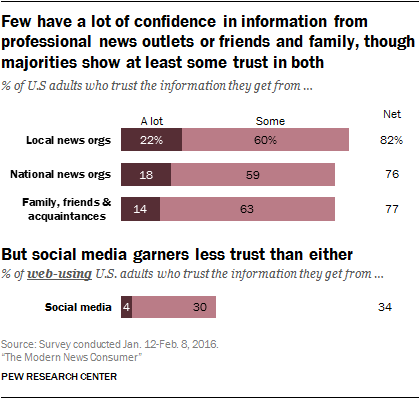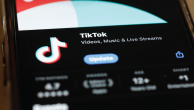Few have a lot of confidence in the information they get from professional outlets or friends and family, but large majorities have at least some trust in both; social media gets substantially lower trust scores.

- Only about two-in-ten Americans (22%) trust the information they get from local news organizations a lot, whether online or offline, and 18% say the same of national organizations, slightly higher than the 14% who say this of the information they get from their friends and family. While the portion saying they have a lot of trust in each group is low, large majorities have at least some trust.
- Social media, on the other hand, is trusted by a slim minority – only 4% of web-using adults have a lot of trust in the information they find on social media. And that rises to only 7% among those who get news on these sites.
- When those who get news online from each source type were asked specifically about each’s accuracy, news organizations again sit at the top; 15% of those who get news from news organizations online find them very accurate, compared with 7% who say the same about people they are close with and just 2% for people they are not particularly close with.
- Democrats are more likely than others to have “a lot” of trust in the information from national news organizations: 27% do, compared with 15% of Republicans and 13% of Independents. Those ages 50+ (22%) are also more likely than those ages 18-29 (10%) and those 30-49 (16%) to trust information from national news organizations a lot.
U.S. adults see the news media as performing its watchdog function – but overwhelmingly say that news organizations are biased.

- Three-quarters of Americans think that news organizations keep political leaders in check – preventing them from doing things that they shouldn’t be doing.
- But about the same portion (74%) say that news organizations tend to favor one side – including 75% of those who say the media prevents leaders from doing things they shouldn’t.
- Political differences emerge here with conservative Republicans most likely to think that news organizations are one-sided.
- This ideological difference is reinforced by earlier research that asked about trust of individual news organizations. Of the 36 sources asked about in our 2014 survey, 28 of them were trusted more than distrusted by respondents who expressed consistently liberal political views across a range of questions about political values; 24 of them were distrusted more than trusted by consistent conservatives.
Americans are more evenly divided on whether online news they get from friends and family is one-sided – but many would prefer that it were not.

- 35% of online news consumers say the news they get from their friends and family online is one-sided; 31% say that it represents more than one side.
- Most, 69%, of those who say that the news from friends and family online is one-sided would prefer that they post or send things that represent a greater mix of views. Three-in-ten are OK with the one-sidedness.
- Conservative Republicans that say the news they get from friends and family is fairly one-sided are much more likely than others to say that this is OK (51%, compared with about a third or less of other political groups).




